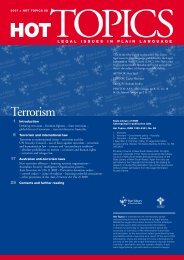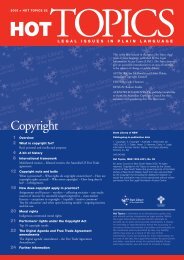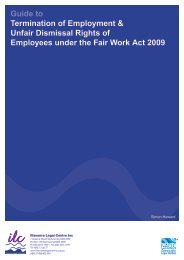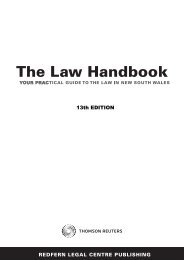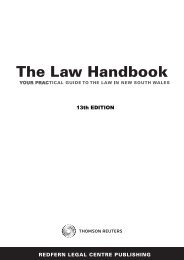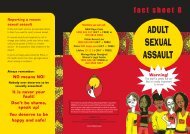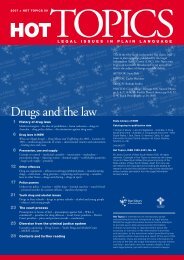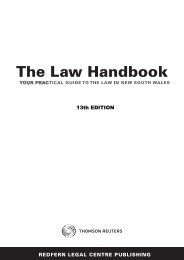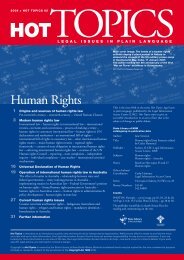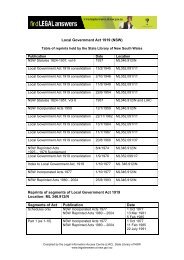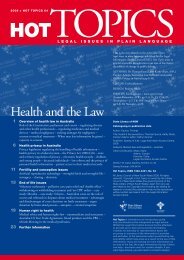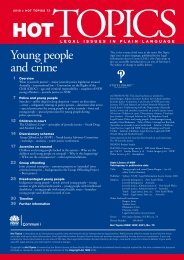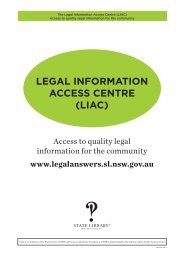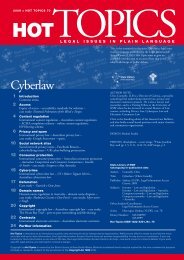Shelter - Hot Topics 57 - Legal Information Access Centre - NSW ...
Shelter - Hot Topics 57 - Legal Information Access Centre - NSW ...
Shelter - Hot Topics 57 - Legal Information Access Centre - NSW ...
- No tags were found...
You also want an ePaper? Increase the reach of your titles
YUMPU automatically turns print PDFs into web optimized ePapers that Google loves.
Premises licensed by DADHC are often called licensedboarding houses or licensed residential centres (‘LRCs’).These licences include conditions relating to the standardof accommodation and care provided by the LRC,and DADHC is responsible for monitoring LRCs andensuring that they comply with licence conditions.Note that these licences, which are between DADHCand boarding house operators, are different and separatefrom the licences between boarding house operators andindividual boarders and lodgers.Almost all LRCs are operated on a for-profit basis byprivate landlords, and charge rents equivalent to 70-100per cent of a resident’s income. There are currently 55LRCs in New South Wales, with a total capacity of 900beds; in 1993, there were 179 LRCs providing 3900beds. 24 There are, of course, many more boarding housesproviding accommodation to two or more people withdisabilities than the 55 currently licensed by DADHC.laW refOrmCommunity groups have long argued for the need toreform the law relating to boarders and lodgers. Attimes governments from both sides of politics havealso acknowledged the need for law reform. Despitenumerous reviews, promises and Bills, boarders andlodgers still have no legislated rights.Of the Australian states and territories, only NewSouth Wales and Western Australian have no legislationcovering boarders and lodgers. The other states andterritories each make very different provisions forboarders and lodgers. For example, Victoria’s ResidentialTenancies Act 1997 (Vic) makes specific provisions forresidents of ‘rooming houses’, including periods of noticeand grounds for termination, but that Act excludes‘residential care services’, including service agenciesfunded under the Victorian Disability Services Act 1991.In Queensland, the Residential Services (Accommodation)Act 2002 (Qld) applies narrowly to residential servicesunder the Residential Services (Accreditation) Act 2002(Qld), which applies only to services that accommodatefour or more residents.To generalise, across Australia the predominant modelof legislation relating to boarders and lodgers providesa prescribed regime of rights and responsibilities, whichapplies to a prescribed class of residents, premises oragreements.A different approach to law reform has been taken bythe Australian Capital Territory. In 2004, amendmentsto the Residential Tenancies Act 1997 (ACT) madeprovisions in relation to ‘occupancy agreements.’ Theseprovisions are intended to apply not to a narrowlyprescribed class, but to all residential renters who arenot tenants under the Act. Also, instead of prescribinga regime of specific rights and responsibilities, the Actsets out a list of ‘occupancy principles’, which are lessprescriptive than the provisions relating to residentialtenancy agreements. The Act does provide for standardoccupancy terms to be made by Regulation, which mayapply to specific types of occupancy agreement and alsogives the ACT Residential Tenancies Tribunal the powerto deal with disputes.image u navailableResident, Sam Chapman takes a look at one of the more run down rooms at Western Lodge, a supported residentialservice in Melbourne.Angela Wylie, The Age (Melbourne), 2006.24. DADHC: monitoring standards in boarding houses, <strong>NSW</strong> Ombudsman, 2006; http://www.ombo.nsw.gov.au/publication/specialreport.asp20HOT TOPICS <strong>57</strong> > <strong>Shelter</strong>



